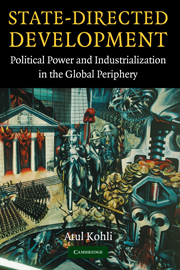Book contents
- Frontmatter
- Contents
- List of Tables and Figures
- Acknowledgments
- Introduction: States and Industrialization in the Global Periphery
- PART I GALLOPING AHEAD: KOREA
- PART II TWO STEPS FORWARD, ONE STEP BACK: BRAZIL
- PART III SLOW BUT STEADY: INDIA
- 6 Origins of a Fragmented-Multiclass State and a Sluggish Economy: Colonial India
- 7 India's Fragmented-Multiclass State and Protected Industrialization
- PART IV DASHED EXPECTATIONS: NIGERIA
- Conclusion: Understanding States and State Intervention in the Global Periphery
- Select Bibliography
- Index
6 - Origins of a Fragmented-Multiclass State and a Sluggish Economy: Colonial India
Published online by Cambridge University Press: 05 September 2012
- Frontmatter
- Contents
- List of Tables and Figures
- Acknowledgments
- Introduction: States and Industrialization in the Global Periphery
- PART I GALLOPING AHEAD: KOREA
- PART II TWO STEPS FORWARD, ONE STEP BACK: BRAZIL
- PART III SLOW BUT STEADY: INDIA
- 6 Origins of a Fragmented-Multiclass State and a Sluggish Economy: Colonial India
- 7 India's Fragmented-Multiclass State and Protected Industrialization
- PART IV DASHED EXPECTATIONS: NIGERIA
- Conclusion: Understanding States and State Intervention in the Global Periphery
- Select Bibliography
- Index
Summary
Like Brazil, India is a case of mixed economic performance in the second half of the twentieth century: more sluggish than rapidly industrializing South Korea but with its diversified industrial base much sounder than Nigeria. Any comparative analysis must therefore ask why India has been as successful as it has been but also why it has not done better. The state has played the central role in producing this mixed economic outcome, the argument being that the modern, interventionist state that replaced the laissez-faire colonial state at midcentury provided a framework for modest economic growth and industrialization, a clear improvement over the nearly stagnant, free-market colonial economy that had preceded it. State intervention also laid the groundwork for the emergence of a more vibrant private economy toward the end of the century. At the same time, however, the fragmented-multiclass state that India inherited and created was relatively inefficacious, characterized by a considerable gap between its ambitions and capacities. This state inefficacy, in turn, limited the impact of state interventions and retarded the rate and pattern of industrialization.
The present chapter analyzes the impact of colonialism on the formation of the Indian state and industrial economy, especially in the first half of the twentieth century. Three lines of argument are developed, two concerning the political situation and one concerning the political economy. First, the state that Indians inherited from their colonial past was modern and democratic yet not all that effective as an economic actor.
- Type
- Chapter
- Information
- State-Directed DevelopmentPolitical Power and Industrialization in the Global Periphery, pp. 221 - 256Publisher: Cambridge University PressPrint publication year: 2004
- 1
- Cited by



